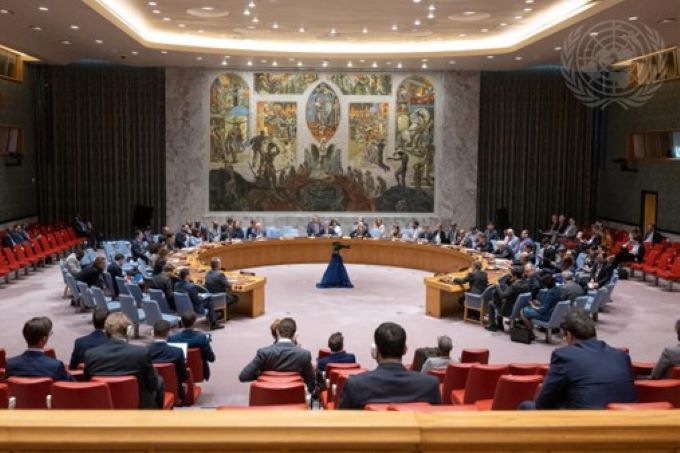
Members of the United Nations Security Council (UNSC) discussed on the 6th of February 2024, the periodic report presented by Jeanine Hennis-Plasschaert, the Special Representative of the Secretary-General and Head of United Nations Assistance Mission to Iraq (UNAMI). The report delved into various aspects of the country's recent developments. The meeting emphasised the critical importance of exercising restraint to preserve Iraq's hard-earned stability, covering issues ranging from ongoing security challenges to political bickering, and broader concerns like climate change and diversity management.
Amid ongoing conflicts and security challenges in the Middle East, the report highlights the critical situation faced by the people of Iraq. The reports emphasise the persistent attacks from various sources that threaten the hard-won stability of the country. The complexity of the situation is underscored, with armed groups in Iraq justifying their operations using doctrines that transcend political boundaries. Highlighting the necessity of an enabling environment for Iraq's stability, in this regard the report urges restraint from all sides, including armed actors and neighbouring countries. While describing recent developments, such as local elections in December 2023 and efforts to strengthen the finance and banking sectors, ongoing challenges are outlined, including political bickering, delayed parliamentary elections in the Kurdistan Region, financial disputes between Baghdad and Erbil, and the need for an inclusive approach to prevent recurring conflicts.
In response to escalating tensions and recent U.S. airstrikes in Iraq, Ms. Hennis-Plasschaert, stressed the critical importance of exercising restraint to safeguard Iraq's hard-earned stability. Expressing concern over the ongoing Gaza conflict, she emphasised that messaging through strikes heightens tensions, inflicts harm, and risks undoing the progress achieved over the past 18 months. Providing updates on the Kurdistan region, Hennis-Plasschaert highlighted the Iraqi Government's commitment to addressing and urging expedited progress for sustainable development and improved living standards. The Secretary-General's Special Representative reiterated the call to cease attacks, emphasising the substantial risks and potentially devastating consequences of continued escalation.
During the Security Council discussion, members collectively praised Iraq's local elections and economic reforms, emphasising support for stability while expressing concerns about the regional implications of the Gaza conflict and urging de-escalation. Representatives from Algeria, Russia, the United States, China, Slovenia, and Iraq offered their perspectives on sovereignty, stability, and the significance of international collaboration in assisting Iraq's progress.
China welcomed Iraq's economic reforms and provincial council elections, stressing the need for sustained dialogue with Kurdistan. They voiced concern over the Palestinian-Israeli conflict and called on major countries to respect Iraq's sovereignty.
France also appreciated the provincial elections, advocating for elections in Kurdistan and dialogue between Baghdad and Erbil. It condemned attacks in the Kurdistan region and expressed worry about the impact of the Gaza conflict.
Switzerland commended what it viewed as Iraq's progress supported by UNAMI, underscoring the importance of maximum restraint to de-escalate hostilities. They highlighted the need to respect Iraq's sovereignty, uphold the rule of law, and protect human rights.
Russia criticised external attempts to exploit Iraq's issues, emphasising the necessity of inclusive dialogue. They condemned the United States' role in Iraq and urged respect for Iraq's sovereignty.
The United States reiterated its commitment to Iraq's security, criticised Iran-aligned militias, and condemned attacks on Coalition forces. They supported UNAMI's role in elections, human rights, and government reform, emphasising the importance of respecting Iraq's sovereignty.
Established in 2003, UNAMI focusing on strengthening institutions, promoting national dialogue, and unity. Its mandate expanded to emphasise political processes, electoral support, regional dialogue, and human rights.
Geneva International Centre for Justice (GICJ) finds that the report of the UN Envoy to Iraq repeating almost same issues and views which were under discussion by the UNSC since 2003. There is no real improvement in the situation. The people of Iraq are suffering from all types of human rights violations, they are deprived from their basic rights. There is no sign of improvement in the basic services, especially with regard water and sanitation, electricity, and reconstruction. The health and education systems are both suffering from lack of equipment, facilities and professional leaders. GICJ expresses concern about ongoing daily interference in Iraq’s affairs, and threats and attacks from Iran-backed militias, contributing to heightened tensions domestically and regionally.
Iraq needs a free election under international scrutiny, accountability for all type of violations, ending corruption and end impunity for all those accused of being corrupt, and a genuine reconstruction plane, at least to bring back the country to what it was before 2003.




